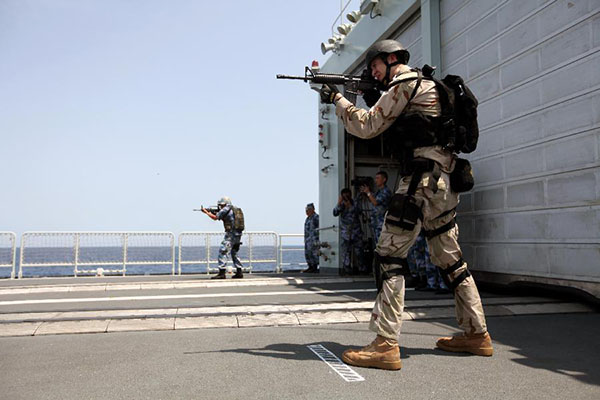US' accusation about anti-terror law
- By Shen Dingli
 0 Comment(s)
0 Comment(s) Print
Print E-mail China Daily, December 30, 2015
E-mail China Daily, December 30, 2015
|
|
|
Chinese and US soldiers participate in joint counter-piracy exercise on the missile destroyer "Harbin" of Chinese navy in the Gulf of Aden, in this Aug 25, 2013 file photo. [Photo/Xinhua] |
The Standing Committee of the National People's Congress, China's top legislature, approved the country's first counterterrorism law on Sunday. The new law, which will enter into force on Friday, proposes a national leading body to identify terrorist activities and personnel and coordinate nationwide anti-terrorist work. This will help fight terrorism at home and help maintain global security.
Yet, in the eyes of US State Department spokeswoman Gabrielle Price, the law "will do more harm than good against the threat of terrorism", because it will "lead to greater restrictions on the exercise of freedoms of expression, association, peaceful assembly, and religion within China", and "constrict US trade and investment in the country".
Such a statement is hardly a surprise, as Washington has long taken pride in its self-proclaimed role as a champion of freedom of speech, which has actually been restricted by legislation since the terrorist attacks on Sept 11, 2001. The truth is the country's law enforcement departments never compromise when it comes to lawfully fighting terrorism and silencing those seeking to incite terrorist acts, which is basically a consensus of most Americans.
Known as any activity that by means of violence, sabotage or threat, generates social panic, undermines public security, infringes on personal and property rights, and menaces government organs and international organizations, terrorism and its derivative ideology must be properly dealt with. Curbing the dissemination of extremist ideas is not violating basic human rights; instead, it is protecting the rights of the majority.
That Washington accused Beijing's new counterterrorism law of infringing on freedom of speech, without referring to its own actions, is solid evidence of its double standard.






